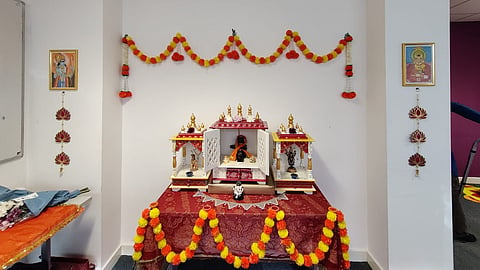British Indian student relives campaign to set up Lancaster University’s Hindu Prayer Room
Second year Economics students Sai Karumuri from Lancaster University took on more than just academics — he led a campaign to establish a Hindu Prayer Room at his university. Passionate about religious inclusivity, he turned his vision into reality, creating a space for worship, cultural exchange, and education.
Navigating bureaucratic hurdles and university policies, Sai relied on perseverance, community support, and family backing to overcome challenges.
In this interview, he shares his journey, the obstacles faced, and the lasting impact of fostering unity on campus.
What does religious inclusivity mean to you?
I've always believed in embracing our differences as a society. As head boy in high school, I helped start our school's first-ever, school-wide Diwali celebration, which has since become a lasting tradition. It’s a huge event. Everyone gets together and celebrates, and they get the exposure to actually learn about our traditions
At university, I wanted to create a space not just for prayer but for education - helping people understand our traditions, especially those who haven't had the same exposure. So that’s what prompted it. My goal was to make it a place for cultural learning rather than just a place for worship.
MORE LIKE THIS…
How did this campaign for a Hindu Prayer Room get going?
The project began before I joined the Hindu Society Executive team, as it was something I was passionate about. I decided to take a proactive approach and start making progress before being on the exec. I began by speaking to people in the Student Union and other religious societies with existing prayer rooms.
It was fairly straightforward; the main challenge was finding a good contact in the Student Union. Once I established that relationship and clarified our needs, I worked with the International Students Forum, led by a close friend. Communication was smooth, and soon after, I discovered there was an unused room at the university. It had been removed from the timetable for maintenance, and once fixed, it was no longer needed.
It was essentially a backup room. Acquiring it took a few months, involving back-and-forth discussions with the Student Union and a petition. I finally secured the room around September 2024, just before my second year began in October, which was a huge milestone, and everyone was so happy.
From there, the real challenges began - aligning our vision with the university’s restrictions. For instance, we wanted a large, freestanding altar but preferred to fix it to the wall, but the university didn’t allow fixing anything to the wall. Overcoming these small practical obstacles took the most time. And I'm so fortunate that my family has backed me through this whole process, physically, financially, just they've It's been a great help.
What advice would you give students from other universities hoping to replicate such a prayer room?
There are a few things. If you can find someone with authority within the student union, it will make your job much easier. Embracing the differences, and building relationships with other faith groups on campus is also important. In our case, all the cultural groups in the university stepped up and signed our petition for a room. A good relationship with all the other Indian or religious societies on campus makes a huge difference because you get that numerical advantage. From my experience, the Hindu society isn't the biggest cultural society on my campus, and I know that it's not on a lot of the other campuses.
For example, if we have 100 members and 60% signed the petition, that’s okay. But if we can get hundreds of signatures by incorporating all the societies on campus, that makes a huge difference in the eyes of the university because it shows a genuine demand. It's all about relationships with these things. In a lot of cases in life, it isn't about what you know, it is about who you know.
MORE LIKE THIS…
Why is it important for British Hindus to take such initiatives?
One of the biggest reasons I think it's important is because Sanatana Dharma is such a vast concept. There's no real set of rules for us because of the various different schools of thought within Sanatana Dharma. It’s crucial for British Hindus to understand this diversity and explore the many paths our faith offers. And it goes back to exposure. My Telugu family follows traditions that differ from those of my Gujarati, Marathi, or Hindi friends. Understanding these variations within Hinduism can help you find something that sits better with your natural moral inclination.
For me, prayer and rituals are essential, but I recognise that others may connect more with the spiritual aspects of Sanatana Dharma. While I enjoy Vedic chanting and bhajan sessions, my primary goal in creating this space wasn’t just about rituals - it was about education, giving students the opportunity to explore their faith on their own terms.

